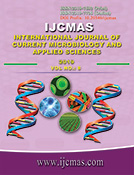


 National Academy of Agricultural Sciences (NAAS)
National Academy of Agricultural Sciences (NAAS)

|
PRINT ISSN : 2319-7692
Online ISSN : 2319-7706 Issues : 12 per year Publisher : Excellent Publishers Email : editorijcmas@gmail.com / submit@ijcmas.com Editor-in-chief: Dr.M.Prakash Index Copernicus ICV 2018: 95.39 NAAS RATING 2020: 5.38 |
Legumes are well recognized for their nutritional and health benefits as well as for their impact in the sustainability of agricultural systems. The threatening scenario imposed by climate change highlights the need for concerted research approaches in order to develop crops that are able to cope with environmental stresses, while increasing yield and quality. During the last decade, some physiological components and molecular players underlying abiotic stress responses of a broad range of legume species have been elucidated. Plant physiology approaches provided general outlines of plant responses, identifying stress tolerance-related traits or elite cultivars. A thorough identification of candidate genes and quantitative trait loci (QTLs) associated with these traits followed (Collins et al, 2008). The products of stress-inducible genes which could be directly protecting against these stresses includes transcription factors, protein kinases and enzymes involved in phosphoinositide metabolism (Knight and Knight, 2001). Crosstalk among various transduction pathways under abiotic stresses ABA biosynthesis suggested connection between cold, drought, salinity and ABA signal transduction pathways (Xiao et al, 2013). Targeted editing of the genomes of living organisms not only permits investigations into the understanding of the fundamental basis of biological systems but also allows addressing a wide range of goals towards improving productivity and quality of crops. These advances will support the development of legumes better adapted to environmental constraints, tackling current demands on modern agriculture and food production presently exacerbated by global climate changes.
 |
 |
 |
 |
 |